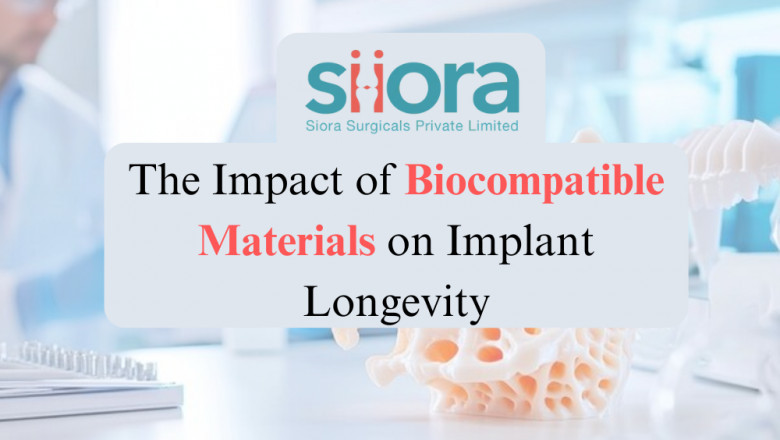views
A critical factor determining the success and longevity of these orthopaedic implants lies in the materials from which they are made. Biocompatible materials, which harmonize with the body’s biological systems, play an essential role in enhancing the durability and functionality of medical implants.
What Do You Mean by Biocompatibility?
Biocompatibility refers to a material’s ability to perform its desired function without eliciting any adverse local or systemic effects. For implants, this means not only avoiding harmful reactions but also integrating effectively with the surrounding tissues. Materials must resist corrosion, minimize inflammatory responses, and ideally support cellular activities such as adhesion and proliferation.
How Biocompatible Materials Enhance Implant Longevity?
Reduced Risk of Rejection
Materials like titanium and its alloys, widely used in orthopedic and dental implants, exhibit excellent biocompatibility. Their ability to form a stable oxide layer prevents corrosion and reduces immune system activation, lowering the likelihood of implant rejection or failure.
Improved Tissue Integration
Bioceramics like hydroxyapatite, which resemble the mineral components of bone, foster strong bonds with host tissues. This integration not only anchors the implant firmly but also encourages natural tissue regeneration around the implant site, contributing to long-term stability.
Enhanced Mechanical Performance
Advanced polymers, such as polyethylene and PEEK (polyether ether ketone), offer a combination of flexibility and strength, mimicking the mechanical properties of natural tissues. These materials can withstand repeated stress and strain, making them ideal for load-bearing applications.
Bioactive Coatings
Innovations in surface engineering have led to bioactive coatings that promote cellular adhesion and growth. For instance, coating titanium implants with bioactive glass or growth factors can expedite osseointegration (bone bonding), accelerating the healing process and reinforcing the implant's position within the body.
Antimicrobial Properties
Infections pose a significant threat to implant longevity. Biocompatible materials with inherent or engineered antimicrobial properties can help mitigate this risk. Silver nanoparticles, for example, have been incorporated into coatings to combat bacterial colonization, reducing the incidence of implant-associated infections.
Real-World Applications and Success Stories
The success of biocompatible materials is evident across various medical fields. In orthopedics, titanium hip and knee replacements have demonstrated decades-long durability. In dentistry, zirconia implants offer aesthetic and functional benefits with excellent long-term outcomes. Meanwhile, cardiac stents made from nitinol (a nickel-titanium alloy) provide life-saving vascular support with remarkable resilience and flexibility.
Future Directions and Innovations
Ongoing research continues to push the boundaries of what biocompatible materials can achieve. Scientists are exploring the potential of biodegradable implants that dissolve once their function is complete, eliminating the need for removal surgeries. Additionally, smart implants with embedded sensors are being developed to monitor real-time data, providing insights into implant performance and potential complications.
Conclusion
The impact of biocompatible materials on implant longevity cannot be overstated. By enhancing integration, reducing complications, and promoting natural tissue interactions, these materials have paved the way for more reliable and enduring medical implants. As research progresses, the development of even more sophisticated biomaterials promises to further improve patient outcomes and transform the landscape of modern medicine.
If you are looking to be an orthopedic distributor in Lebanon, contact Siora Surgicals Pvt. Ltd., a renowned name in the orthopedic implant manufacturing industry.






















Comments
0 comment